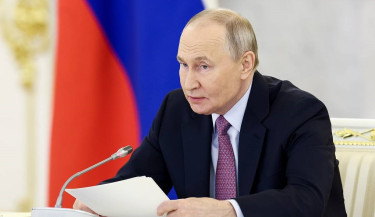Trending
- Judiciary without independence is no judiciary at all: Ex-justice Moyeenul
- Contractionary monetary policy hits private sector hard: GED
- Fire at Kuala Lumpur’s Petronas Tower 3 extinguished
- Without referendum, election will be meaningless: Jamaat Ameer
- Weak governance led to regime change in Bangladesh: Ajit Doval
- Social media abuse reaches breaking point
- Journalists hold nationwide protests demanding implementation of ‘No Wage Board, No Media’ policy
- Russian House celebrates Sputnik Cosmosfest 2025 in Dhaka
- Nikolaos Margaropoulos and Asif Chowdhury re-elected to lead World Federation of Consuls
- Fakhrul slams Jamaat for ‘spreading lies’ to mislead people ahead of election
- Maldives begins 'generational ban' on smoking
- Anti-drug cricket match hosted in Haluaghat
- Awareness campaign and larvae destruction drive launched in Rupganj
- Tools distributed among cobblers in Meherpur
- Election will be held in first half of February: EC Anwarul
- Sewing training center opened in Sreemangal
- Attempts to use religion resurface ahead of elections: Salahuddin
- BNP launches seven new teams for coordinated media, communication initiative
- CA’s office asks officials to avoid foreign travels until election
- ‘Community Liberty Action Day’ held at JU
- BNP to revoke power sector indemnity provision if voted to power: Rizvi
- BTRC to deactivate extra SIMs beyond limit from Saturday
- Global water crisis could cost trillions
- Jovan, Keya Payel star in dark comedy thriller ‘Taka’
- ‘Is he our man?’
- BNP to create 1cr jobs if voted to power: Khosru
- CA discusses election preparations with chiefs of armed forces
- White House restricts access for journalists to press secretary's office
- Shanto returns as Test captain after resolving dispute
- Govt moves to transform SME sector into key economic driver

